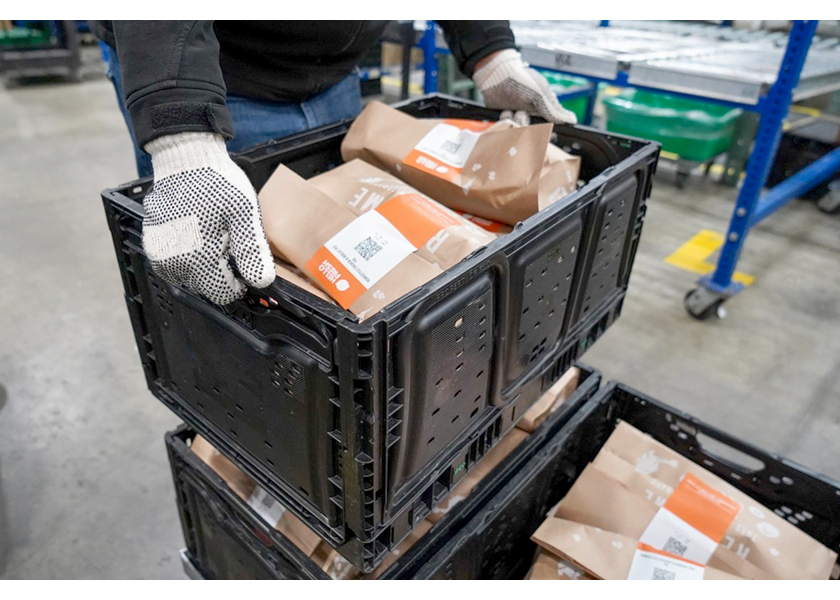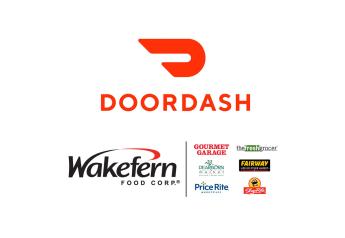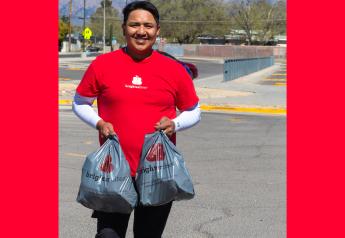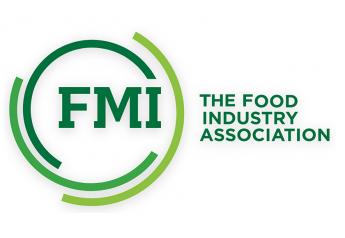IFCO reusable packaging containers help HelloFresh pursue efficiency, sustainability amid growth in meal kit deliveries

HelloFresh has become an international leader in direct-to-consumer meal kits, but as e-commerce food delivery demand surged during the pandemic, the company worked with Tampa, Fla.-based IFCO Systems to optimize logistics and support sustainability initiatives.
Berlin-based HelloFresh saw revenue rise to 3.75 billion euros in 2020, double the results of 2019, delivering more than 600 million meals to customers in 14 countries that year, according to a reference case published by IFCO. Jeff Yorzyk, director of sustainability at HelloFresh US, said in the case study that, in doing business at such a scale, IFCO Reusable Packaging Containers (RPCs) have been a key part in the company’s pursuit of growth, supply chain efficiencies and sustainability.
“During the pandemic, the adaption of e-commerce increased and demand for home delivery of food rapidly accelerated — and that behavior is expected to continue,” Yorzyk said in the report. “Now we’re looking at a lot more optimizing around the meal kit supply chain through the use of data analytics, innovative sustainable packaging and automation.”
The HelloFresh production cycle involves packing individual recipes in paper bags, which are then staged in IFCO RPCs that can be moved smoothly to the production line, where customer shipment boxes are assembled.
“It’s therefore crucial that the IFCO RPCs support the staging of meal kits in a way that allows an easy, safe and efficient packing of the highly variable delivery boxes,” Yorzyk said in the report. He added that the containers’ standard sizing and durability support automation within the industry.
The IFCO RPCs meet a core logistical challenge on the internal side, Yorzyk said in the report. “We’re moving so many things around all the time that if the IFCO RPCs were not collapsible and we had to stage them fully expanded, we would need bigger facilities.”
The collapsible containers can be distributed and stored efficiently, and once used can be recollected, cleaned and sanitized for future use. Yorzyk said in the report that this approach allows the company to:
- reduce the physical footprint of the production sites
- target carbon emissions reduction through reusables
- minimize food waste
- prevent packaging waste
- protect produce from damage and extend produce shelf life; maintaining the quality of individual meal kits.
“The IFCO RPCs really help us in meeting our sustainability goals,” Yorzyk said in the report. “They maximize our ability to use our facilities more efficiently and help minimize food waste. They also help us to reduce the need to recycle cardboard. We will continue to rely on and look for ways to increase our use of IFCO RPCs. We’re always looking for ways to reduce the waste stream of cardboard that enters our supply chain.”
The RPCs have proven a superior option for food safety and quality for the customer, Yorzky said in the report. “If we were using and reusing cardboard for our internal logistics, the potential for cross-contamination of spoiled goods would be much higher. The IFCO product management and pooling system helps us guarantee food quality and safety with great reliability.
“We’ve tried conventional boxes for our internal processes, but the paper bags get damaged, crushed and wrinkled during production,” Yorzyk continued. “When the HelloFresh meal kits are safely cradled in the robust IFCO RPCs throughout the internal logistics process, they are better protected. The quality level of our fresh produce is maintained longer for a better consumer experience.”
While HelloFresh has grown over the years by focusing on its strengths, it has relied on IFCO to provide durable, space-saving crates that move in and out of the company’s system rapidly while reducing environmental impact.
“Maintaining containers, sorting them, sanitizing them, monitoring them for issues and deciding when they need to be repaired or recycled, that is not a core competency we would want to internalize. It’s not one that makes sense when we’re such a high growth business,” Yorzyk said in the report. “Knowing that IFCO is tracking and maintaining the RPCs that we use in very high volumes inside the facility allows us to focus on our true business priorities. And that makes the IFCO model very effective.”







